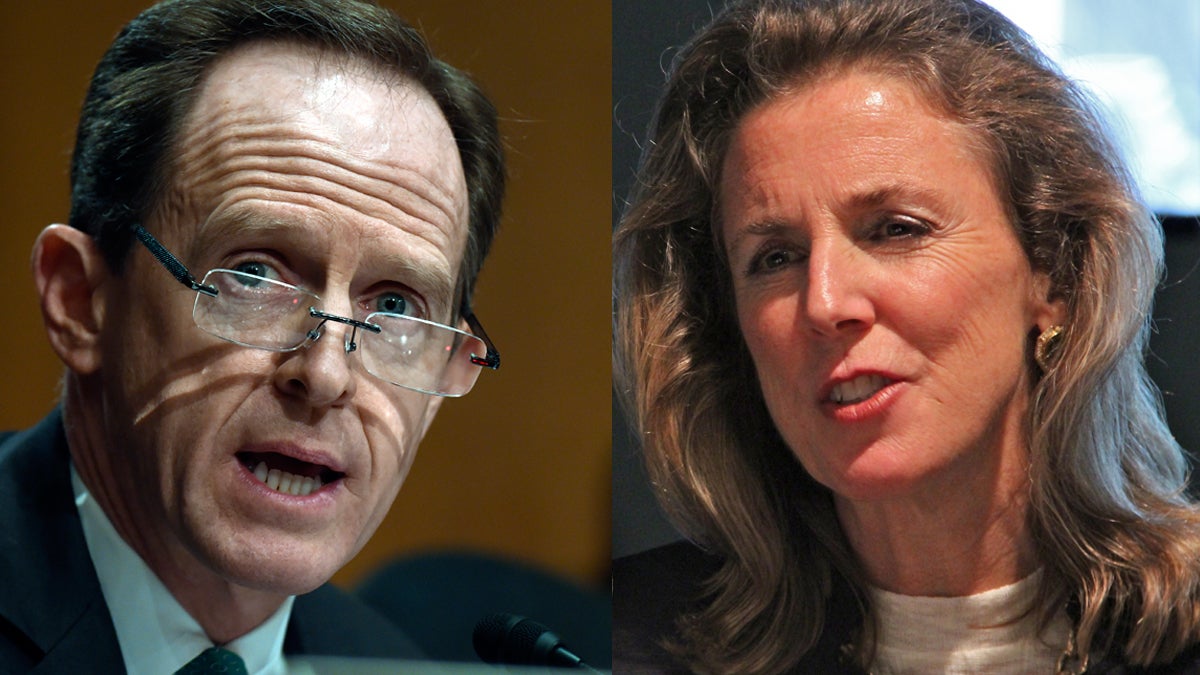Looking at ugly ad wars in Pa. Senate race
Listen
Republican incumbent U.S. Sen. Pat Toomey (left) and Democratic nominee for U.S. Senate Katie McGinty. (Susan Walsh/AP Photo and Emma Lee/WHYY)
Literally minutes after Katie McGinty claimed victory in the Democratic primary for a Pennsylvania U.S. Senate seat, incumbent Republican Sen. Pat Toomey fired off a blistering press release attacking McGinty’s personal integrity.
Attack ads followed within hours, and Democrats have responded with TV shots at Toomey.
Game on.
Why are we seeing this depressing exchange of sludge six months before anybody can cast a vote?
Toomey has a $9 million campaign fund and a chance to define McGinty before voters get to know her. It’s the old political game — define your opponent before she can define herself.
And Franklin & Marshall government professor Stephen Medvic made another interesting point.
“Both campaigns are going to be well funded, and I think, in the fall, there’s also going to be probably a lot of campaign spending at the presidential level,” Medvic said. “So the airwaves might be crowded and noisy then, so I think they think now would be the time to get their message through.”
Aren’t we lucky?
It’s also interesting that the attacks on McGinty, from the Toomey campaign and the Club for Growth, aren’t the traditional Republican attacks on Democrats as tax-and-spenders. They’re painting McGinty as a sleazy, self-dealing politician who’s used public service for private gain and even been a lobbyist.
Medvic says he sees these attacks as attempts to capitalize on the voter anger that’s fueling the Donald Trump and Bernie Sanders campaigns.
The pro-McGinty response ads, from the public employee union AFSCME and the state Democratic Party, say Toomey is a rich guy who worked on Wall Street then represented its interests in Congress.
The ads: Truth, lies, both?
Like most attack ads, these have a kernel of truth (some larger than others) that’s presented out of context and exaggerated to make the target a monster.
You can see the four attack ads below, and I’ve assembled some of the backup material (also known as opposition research) from the two campaigns so you can examine their claims in detail, with links to sources they cite.
The Toomey material is here, the McGinty material here.
Here are some observations from my look at the material presented so far.
The Club for Growth ad’s claim that when McGinty was in government, she “gave millions in grants to her husband’s company” is inaccurate.
There was a 2007 controversy (fueled in part by Republicans in the legislature) about her department funding an environmental nonprofit her husband did consulting work for, and the state ethics commission said she should avoid any role in future grants.
But her husband’s earnings, less than $4,000, were a tiny fraction of the funding, which began under a Republican governor.
It is true, as Toomey says, that after McGinty left the Rendell administration, she had a paid board position with a company that had benefited from state grants.
McGinty says she’s proud of the companies she’s worked with, that they did environmentally sound work, and she notes she’s gotten the support of environmental groups.
There’s more to come on this subject as the campaign progresses.
The Toomey ad claims that McGinty was ” Pennsylvania’s worst abuser” of the revolving door between government work and private business is dubiously sourced.
The citation for the claim is State Impact’s Blurred Lines website, which allows readers to see which public officials in Pennsylvania have moved back and forth between the public and private sectors.
The site doesn’t name a “worst abuser.” That’s a characterization of the Toomey campaign came up with based on the number of high government jobs and private-sector posts she held.
Democratic claims about Toomey are mostly loaded characterizations of his business work and policy critiques of his role in Congress, which are open to debate.
The Democratic Party ad says Toomey “made millions while making nothing” on Wall Street and that, in Congress, he carried Wall Street’s water, “fighting to let them continue risky trades and avoid consumer protection.”
It’s true Toomey worked in the financial sector before entering politics, and he has a different view of government regulation than Democrats.
But Toomey says he opposed the bank bailout and other public subsidies to business. It’s a subject that’s certain to be debated further as the campaign unfolds.
WHYY is your source for fact-based, in-depth journalism and information. As a nonprofit organization, we rely on financial support from readers like you. Please give today.


